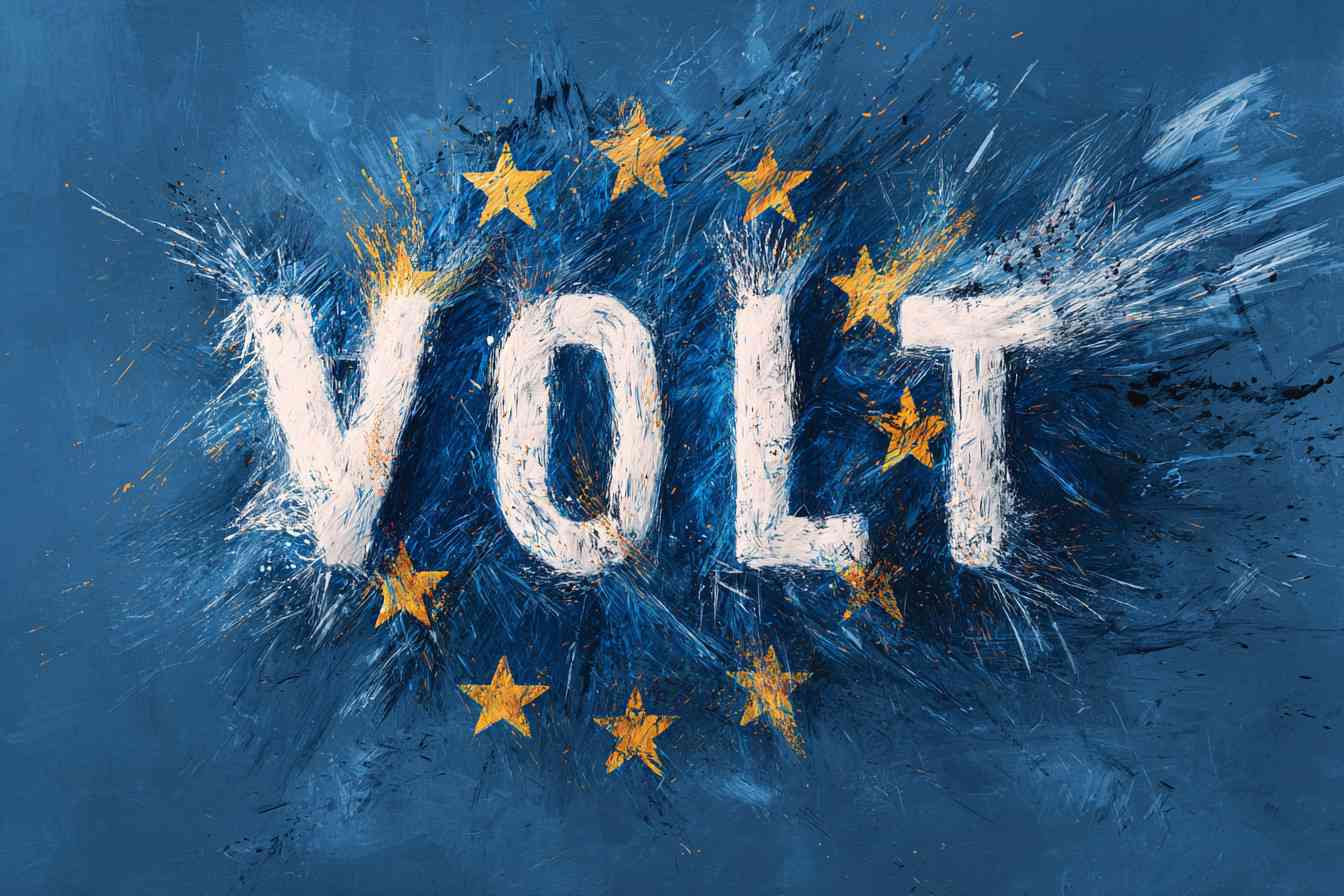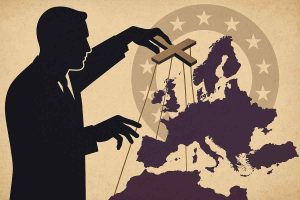Volt and the new globalism: how an apparently idealistic party pursues a technocratic utopia

The rise of a European sect in political disguise
Volt Netherlands presents itself as modern, progressive and hopeful. Young, energetic and supposedly opposed to the old political establishment. But behind that façade of renewal hides something far more fundamental: an international movement that seeks to undermine national sovereignty and establish a centralized, technocratic superstate. Volt is not a traditional party in the Dutch context, but the Dutch branch of Volt Europa, a pan-European organization with one ideology, one structure and one goal: the creation of a federal European state in which national democracies are replaced by a bureaucratic empire of administrators and technocrats (Volt Europa, Programme, Volt Europa).
Volt was founded in 2017 by the Italian Andrea Venzon, the German Damian Boeselager and the French Colombe Cahen-Salvador, who presented the party as “the first truly pan-European movement.” Their ideal: a “United States of Europe.” To many this sounds like a noble project of cooperation, but in practice it means that countries such as the Netherlands must largely surrender control over their own laws, borders, taxes and defense.
According to critics, Volt is not merely a political party but rather a project of power transfer, wrapped in idealistic language. Under the banner of “more European cooperation, ” the movement seeks to transform national democracies into provinces of a centrally governed Europe. Thus, in the eyes of many, Volt is an instrument of post-democratic governance, not of renewal but of submission (Post-Democracy, Colin Crouch).
Ideological roots: technocracy, progressivism and moral collectivism
Volt calls itself progressive, social-liberal and “data-driven.” In reality its ideology is a blend of technocratic globalism and moral collectivism. The party believes that policy decisions should no longer be determined nationally but through “scientific consensus” and “European coordination.” In practice this means democratic decision-making is replaced by technocratic planning.
The collectivist element is visible in its emphasis on a shared European identity, migration as “enrichment, ” and the rejection of national borders. Volt’s program states that borders “separate people who should be connected, ” a statement that directly clashes with the fundamental right of states to protect their own territory (Volt Manifesto, Volt Europa).
This combination of technocracy and moral universalism shows strong parallels with communist structures: central governance, uniform policy, emphasis on equality above liberty, and the ideological belief that rational management can create a utopian society. Volt’s leaders even speak of “European values” as if these stand above national ones, which recalls the universal truth claims of past ideologies such as Marxism (The Open Society and Its Enemies, Karl Popper).
International ties and the influence of European elites
Volt Netherlands is only one branch of a coordinated network of national chapters in nearly every EU country. All chapters fall under the statutes of Volt Europa, which as a European party is financed through EU subsidies and private donations from funds connected to globalist structures, including George Soros’s Open Society Foundation (Annual Report, Volt Europa).
The party maintains direct links with the European Parliament through its German co-founder Damian Boeselager, who has been an MEP since 2019. Boeselager sits on committees dealing with digital regulation and EU budgets, thereby exerting influence over policy that overrides national legislation (European Parliament Members Register, EU).
That Volt’s funding and direction come from Brussels rather than The Hague is crucial. Where national parties are accountable to their voters, Volt seems accountable to its international network. In that sense, the party functions as a conduit for Brussels agendas: European defense integration, digital identity systems, mandatory climate measures and uniform tax models.
This pan-European structure makes Volt a pawn of the technocratic project that the EU has increasingly become: a union in which power is concentrated in institutions that are not directly elected or controlled by citizens (The European Superstate, Leigh Phillips).
The hidden authoritarian core
Volt presents itself as open and democratic, but in practice it operates a tightly centralized internal organization. Decisions on positions and strategy are not made nationally but at the European level. National branches are not allowed to modify them independently.
This became evident during debates on defense and migration, in which members of Volt Netherlands who argued for greater national autonomy clashed with the European leadership. The central organization decided that Volt must unconditionally continue to advocate for a common European army and open migration policy, regardless of national sensitivities (Internal Governance Charter, Volt Europa).
This strongly resembles the party-line discipline within communist parties: the ideological course is set by the central power, and dissenting views are considered “against European values.” The idea of individual freedom is replaced by collective conformity to a political doctrine that claims to be universal and morally superior.
The illusion of moral superiority
Volt likes to portray itself as the party of reason and morality. Those who oppose its European ideals are quickly dismissed as “populists” or “nationalists.” This black-and-white thinking fits within the broader tendency of moral superiority that characterizes many technocratic movements: they believe they stand on the right side of history, and that opponents are ignorant or immoral (The Road to Serfdom, Friedrich Hayek).
In reality, Volt’s “moral superiority” is a form of ideological narcissism. The party sees itself as the embodiment of progress while in fact helping to build a system that gives citizens less power. By depoliticizing and rationalizing everything, climate, economy, health, migration, politics is reduced to technocratic management. And where technocracy reigns, democracy disappears.
Volt’s support for digital identity systems and European data platforms is a telling example. Under the guise of efficiency and safety, citizens become increasingly monitored and registered. Such policies echo the central registration practices of socialist regimes, in which liberty was exchanged for order and security (Surveillance Capitalism, Shoshana Zuboff).
The gap between rhetoric and reality
Volt claims to promote transparency and inclusion but in practice proves to be as closed and hypocritical as the parties it says it wants to replace. A well-known example is the case of MP Nilüfer Gündogan, who was suspended in 2022 after accusations of inappropriate conduct. The party publicly called for “a safe and transparent political culture, ” but internally was primarily concerned with damage control and reputation management (“Gündogan-zaak toont aan hoe Volt worstelt met eigen waarden”, NRC).
The incident revealed that Volt is not above the human tendencies of power, hypocrisy and self-preservation. On the contrary, its strong emphasis on morality makes it especially vulnerable to hypocrisy. When a movement presents itself as pure and morally superior, every internal failure becomes a moral catastrophe.
Moreover, Volt finds most of its support among urban, highly educated circles, which further alienates it from the general population. Despite its pan-European pretensions, the party is an elitist movement that speaks the language of technocracy, not that of ordinary citizens (The Revolt of the Public, Martin Gurri).
The dangers of European federalism
Volt’s ultimate goal, a fully European federation, may seem distant, but the process is already underway. Every expansion of EU competencies, in defense, taxation, migration or climate, means a further shift of power from national parliaments to European institutions.
Supporters call this efficiency, but in reality it means less democratic control. In the Netherlands, citizens can still influence policy through elections. In Brussels, that influence is virtually nonexistent. Volt’s vision therefore reinforces exactly what Europeans are worried about: a growing divide between rulers and ruled (The EU’s Democratic Deficit, Giandomenico Majone).
By linking this to a morally progressive agenda, climate neutrality, diversity, gender equality, Volt manages to neutralize criticism. Those who oppose its centralist agenda are accused of indifference to these values. In this way, a political strategy becomes a moral shield.
Volt as a symptom of the European illusion
Volt is not the cause but a symptom of a broader European illusion: the belief that a continent with dozens of languages, cultures and traditions can be fused into one political identity. Where earlier generations fought wars for freedom and sovereignty, Volt sacrifices those ideals on the altar of efficient governance and global equality.
In that respect, Volt is the heir to an old utopian dream: the perfectible society. Where communism sought to realize that dream nationally, Volt attempts the same on a continental scale. The underlying idea is identical: if enough power is centralized and everything is rationally planned, the perfect world will emerge.
History teaches, however, that such dreams end in control, censorship and alienation. Whether in Moscow or Brussels, the logic of centralization remains the same. Power attracts power, and where power concentrates, freedom disappears.
Conclusion: the danger of ideals without limits
Volt Netherlands and its parent organization Volt Europa embody a new type of ideological project hiding behind the language of progress and cooperation. Their pan-European idealism is not an expression of democracy but of its dissolution.
Under the guise of a better world, Volt promotes a centralist vision that undermines national democracies, dissolves cultural identity and sacrifices civil liberty for administrative efficiency. The party does not believe in sovereign citizens but in obedient European consumers who conform to “scientific consensus” and Brussels directives.
Volt’s danger lies not in open tyranny but in its conviction that moral good equals political right. Those who do not endorse that conviction are excluded. For that reason Volt is not a party of the future but an echo of the past: a new incarnation of the old totalitarian dream in a modern guise.


















